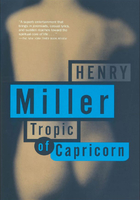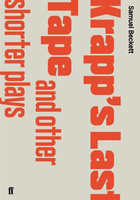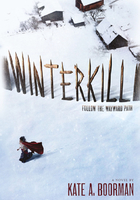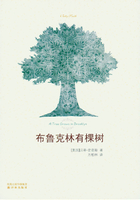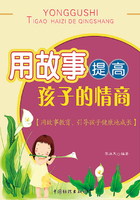A SOLDIER HOME
I
The train went on up the track out of sight, around one of the hills of burnt timber. Nick sat down on the bundle of canvas and on bedding the baggage man had pitched out of the door of the baggage car. There was no town, nothing but the rails and the burned-over country. The thirteen saloons that had lined the one street of Seney had not left a trace. The foundations of the Mansion House hotel stuck up above the ground. The stone was chipped and split by the fire. It was all that was left of the town of Seney. Even the surface had been burned off the ground.
Nick looked at the burned-over stretch of hillside, where he had expected to find the scattered houses of the town and then walked down the railroad track to the bridge over the river. The river was there. It swirled against the log spiles of the bridge. Nick looked down into the clear, brown water, colored from the pebbly bottom, and watched the trout keeping themselves steady in the current with wavering fins. As he watched them they changed their positions by quick angles, only to hold steady in the fast water again. Nick watched them a long time.
He watched them holding themselves with their noses into the current, many trout in deep, fast-moving water, slightly distorted as he watched far down through the glassy convex surface of the pool, its surface pushing and swelling smooth against the resistance of the log-driven spiles of the bridge. At the bottom of the pool were the big trout. Nick did not see them at first. Then he saw them at the bottom of the pool, big trout looking to hold themselves on the gravel bottom in a varying mist of gravel and sand, raised in spurts by the current.
Nick looked down into the pool from the bridge. It was a hot day. A kingfisher flew up the stream. It was a long time since Nick had looked into a stream and seen trout. They were very satisfactory. As the shadow of the kingfisher moved up the stream, a big trout shot upstream in a long angle, only his shadow marking the angle, then lost his shadow as he came through the surface of the water, caught the sun, and then, as he went back into the stream under the surface, his shadow seemed to float down the stream with the current, unresisting, to his post under the bridge, where he tightened, facing up into the current.
Nick's heart tightened as the trout moved. He felt all the old feeling.
He turned and looked down the stream. It stretched away, pebbly-bottomed with shallows and big boulders and a deep pool as it curved away around the foot of a bluff.
Nick walked back up the ties to where his pack lay in the cinders beside the railway track. He was happy. He adjusted the pack harness around the bundle, pulling straps tight, slung the pack on his back, got his arms through the shoulder straps and took some of the pull off his shoulders by leaning his forehead against the wide band of the tumpline. Still, it was too heavy. It was much too heavy. He had his leather rod-case in his hand and leaning forward to keep the weight of the pack high on his shoulders he walked along the road that paralleled the railway track, leaving the burned town behind in the heat, and then turned off around a hill with a high, fire-scarred hill on either side onto a road that went back into the country. He walked along the road feeling the ache from the pull of the heavy pack. The road climbed steadily. It was hard work walking uphill. His muscles ached and the day was hot, but Nick felt happy. He felt he had left everything behind, the need for thinking, the need to write, other needs. It was all back of him.
From the time he had gotten down off the train and the baggage man had thrown his pack out of the open car door things had been different. Seney was burned, the country was burned over and changed, but it did not matter. It could not all be burned. He knew that. He hiked along the road, sweating in the sun, climbing to cross the range of hills that separated the railway from the pine plains.
The road ran on, dipping occasionally, but always climbing. Nick went on up. Finally the road, after going parallel to the burnt hillside, reached the top. Nick leaned back against a stump and slipped out of the pack harness. Ahead of him, as far as he could see, was the pine plain. The burned country stopped off at the left with the range of hills. On ahead islands of dark pine trees rose out of the plain. Far off to the left was the line of the river. Nick followed it with his eye and caught glints of the water in the sun.
There was nothing but the pine plain ahead of him, until the far blue hills that marked the Lake Superior height of land. He could hardly see them, faint and far away in the heat-light over the plain. If he looked too steadily they were gone. But if he only half-looked they were there, the far-off hills of the height of land.
Nick sat down against the charred stump and smoked a cigarette. His pack balanced on the top of the stump, harness holding ready, a hollow molded in it from his back. Nick sat smoking, looking out over the country. He did not need to get his map out. He knew where he was going from the position of the river.
As he smoked, his legs stretched out in front of him, he noticed a grasshopper walk along the ground and up onto his woolen sock. The grasshopper was black. As he had walked along the road, climbing, he had started many grasshoppers from the dust. They were all black. They were not the big grasshoppers with yellow and black or red and black wings whirring out from their black wing sheathing as they fly up. These were just ordinary hoppers, but all a sooty black in color. Nick had wondered about them as he walked, without really thinking about them. Now, as he watched the black hopper that was nibbling at the wool of his sock with its four-way lip, he realized that they had all turned black from living in the burned-over land. He realized that the fire must have come the year before, but the grasshoppers were all black now. He wondered how long they would stay that way.
Carefully he reached his hand down and took hold of the hopper by the wings. He turned him up, all his legs walking in the air, and looked at his jointed belly. Yes, it was black too, iridescent where the back and head were dusty.
"Go on, hopper," Nick said, speaking out loud for the first time. "Fly away somewhere."
He tossed the grasshopper up into the air and watched him sail away to a charcoal stump across the road.
Nick stood up. He leaned his back against the weight of his pack where it rested upright on the stump and got his arms through the shoulder straps. He stood with the pack on his back on the brow of the hill looking out across the country, toward the distant river and then struck down the hillside away from the road. Underfoot the ground was good walking. Two hundred yards down the hillside the fire line stopped. Then it was sweet fern, growing ankle-high, to walk through, and clumps of jack pines; a long undulating country with frequent rises and descents, sandy underfoot and the country alive again.
Nick kept his direction by the sun. He know where he wanted to strike the river and he kept on through the pine plain, mounting small rises to see other rises ahead of him and sometimes from the top of a rise a great solid island of pines off to his right or his left. He broke off some sprigs of the heathery sweet fern and put them under his pack straps. The chafing crushed it and he smelled it as he walked.
He was tired and very hot, walking across the uneven, shadeless pine plain. At any time "he knew he could strike the river by turning off to his left. It could not be more than a mile away. But he kept on toward the north to hit the river as far upstream as he could go in one day's walking.
For some time as he walked Nick had been in sight of one of the big islands of pine standing out above the rolling high ground he was crossing. He dipped down and then as he came slowly up to the crest of the ridge he turned and made toward the pine trees.
There was no underbrush in the island of pine trees. The trunks of the trees went straight up or slanted toward each other. The trunks were straight and brown without branches. The branches were high above. Some interlocked to make a solid shadow on the brown forest floor. Around the grove of trees was a bare space. It was brown and soft underfoot as Nick walked on it. This was the overlapping of the pine needle floor, extending out beyond the width of the high branches. The trees had grown tall and the branches moved high, leaving in the sun this bare space they had once covered with shadow. Sharp at the edge of this extension of the forest floor commenced the sweetest fern.
Nick slipped off his pack and lay down in the shade. He lay on his back and looked up into the pine trees. His neck and back and the small of his back rested as he stretched. The earth felt good against his back. He looked up at the sky, through the branches, and then shut his eyes. He opened them and looked up again. There was a wind high up in the branches. He shut his eyes again and went to sleep.
Nick woke up stiff and cramped. The sun was nearly down. His pack was heavy and the straps painful as he lifted it on. He leaned over with the pack on and picked up the leather rod-case and started out from the pine trees across the sweet fern swale, toward the river. He knew it could not be more than a mile.
He came down a hillside covered with stumps into a meadow. At the edge of the meadow flowed the river. Nick was glad to get to the river. He walked upstream through the meadow. His trousers were soaked with the dew as he walked. After the hot day, the dew had come quickly and heavily. The river made no sound. It was too fast and smooth. At the edge of the meadow, before he mounted to a piece of high ground to make camp, Nick looked down the river at the trout rising. They were rising to insects come from the swamp on the other side of the stream when the sun went down. The trout jumped out of the water to take them. While Nick walked through the little stretch of meadow alongside the stream, trout had jumped high out of water. Now as he looked down the river, the insects most be settling on the surface, for the trout were feeding steadily all down the stream. As far down the long stretch as he could see, the trout were rising, making circles all down the surface of the water, as though it were starting to rain.
The ground rose, wooded and sandy, to overlook the meadow, the stretch of river and the swamp. Nick dropped his pack and rod-case and looked for a level piece of ground. He was very hungry and he wanted to make his camp before he cooked. Between two jack pines, the ground was quite level. He took the ax out of the pack and chopped out two projecting roots. That leveled a piece of ground large enough to sleep on. He smoothed out the sandy soil with his hand and pulled all the sweet fern bushes by their roots. His hands smelled good from the sweet fern. He smoothed the uprooted earth. He did not want anything making lumps under the blankets. When he had the ground smooth, he spread his three blankets. One he folded double, next to the ground. The other two he spread on top.
With the ax he slit off a bright slab of pine from one of the stumps and split it into pegs for the tent. He wanted them long and solid to hold in the ground. With the tent unpacked and spread on the ground, the pack, leaning against a jack pine, looked much smaller. Nick tied the rope that served the tent for a ridgepole to the trunk of one of the pine trees and pulled the tent up off the ground with the other end of the rope and tied it to the other pine. The tent hung on the rope like a canvas blanket on a clothesline. Nick poked a pole he had cut up under the back peak of the canvas and then made it a tent by pegging out the sides. He pegged the sides out taut and drove the pegs deep, hitting them down into the ground with the flat of the ax until the rope loops were buried and the canvas was drum tight.
Across the open mouth of the tent Nick fixed cheesecloth to keep out mosquitoes. He crawled inside under the mosquito bar with various things from the pack to put at the head of the bed under the slant of the canvas. Inside the tent the light came through the brown canvas. It smelled pleasantly of canvas. Already there was something mysterious and homelike. Nick was happy as he crawled inside the tent. He had not been unhappy all day. This was different though. Now things were done. There had been this to do. Now it was done. It had been a hard trip. He was very tired. That was done. He had made his camp. He was settled. Nothing could touch him. It was a good place to camp. He was there, in the good place. He was in his home where he had made it. Now he was hungry,
He came out crawling under the cheesecloth. It was quite dark outside. It was lighter in the tent.
Nick went over to the pack and found, with his fingers, a long nail in a paper sack of nails, in the bottom of the pack. He drove it into the pine tree, holding it close and hitting it gently with the flat of the ax. He hung the pack on the nail. All his supplies were in the pack. They were off the ground and sheltered now.
Nick was hungry. He did not believe he had ever been hungrier. He opened and emptied a can of pork and beans and a can of spaghetti into the frying pan.
"I've got a right to eat this kind of stuff, if I'm willing to carry it," Nick said. His voice sounded strange in the darkening woods. He did not speak again.
He started a fire with some chunks of pine he got with the ax from a stump. Over the fire he stuck a wire grill, pushing the four legs down into the ground with his boot. Nick put the frying pan on the grill over the flames. He was hungrier. The beans and spaghetti warmed. Nick stirred them and mixed them together. They began to bubble, making little bubbles that rose with difficulty to the surface. There was a good smell. Nick got out a bottle of tomato catchup and cut four slices of bread. The little bubbles were coming faster now. Nick sat down beside the fire and lifted the frying pan off. He poured about half the contents out into the tin plate. It spread slowly on the plate. Nick knew it was too hot. He poured on some tomato catchup. He knew the beans and spaghetti were still too hot. He looked at the fire, then at the tent, he was not going to spoil it all by burning his tongue. For years he had never enjoyed fried bananas because he had never been able to wait for them to cool. His tongue was very sensitive. He was very hungry. Across the river in the swamp, in the almost dark, he saw a mist rising. He looked at the tent once more. All right. He took a full spoonful from the plate.
"Chrise," Nick said, "Geezus Chrise," he said happily.
He ate the whole plateful before he remembered the bread. He finished the second plateful with the bread, mopping the plate shiny. He had not eaten since a cup of coffee and a ham sandwich in the station restaurant at St. Ignace. It had been a very fine experience. He had been that hungry before, but had not been able to satisfy it. He could have made camp hours before if he had wanted to. There were plenty of good places to camp on the river. But this was good.
Nick tucked two big chips of pine under the grill. The fire flared up. He had forgotten to get water for the coffee. Out of the pack he got a folding canvas bucket and walked down the hill, across the edge of the meadow, to the stream. The other bank was in the white mist. The grass was wet and cold as he knelt on the bank and dipped the canvas bucket into the stream. It bellied and pulled hard in the current. The water was ice cold. Nick rinsed the bucket and carried it full up to the camp. Up away from the stream it was not so cold.
Nick drove another big nail and hung up the bucket full of water. He dipped the coffeepot half full, put some more chips under the grill onto the fire and put the pot on. He could not remember which way he made coffee. He could remember an argument about it with Hopkins, but not which side he had taken. He decided to bring it to a boil. He remembered now that was Hopkins's way. He had once argued about everything with Hopkins. While he waited for the coffee to boil, he opened a small can of apricots. He liked to open cans. He emptied the can out into a tin cup. While he watched the coffee on the fire, he drank the juice syrup of the apricots, carefully at first to keep from spilling, then meditatively, sucking the apricots down. They were better than fresh apricots.
The coffee boiled as he watched. The lid came up and coffee and grounds rah down the side of the pot. Nick took it off the grill. It was a triumph for Hopkins. He put sugar in the empty apricot cup and poured some of the coffee out to cool. It was too hot to pour and he used his hat to hold the handle of the coffeepot. He would not let it steep in the pot at all. Not the first cup. It should be straight Hopkins all the way. Hop deserved that. He was a very serious coffee maker. He was the most serious man Nick had ever known. Not heavy, serious. That was a long time ago. Hopkins spoke without moving his lips. He had played polo. He made millions of dollars in Texas. He had borrowed carfare to go to Chicago, when the wire came that his first big well had come in. He could have wired for money. That would have been too slow. They called Hop's girl the Blonde Venus. Hop did not mind because she was not his real girl. Hopkins said very confidently that none of them would make fun of his real girl. He was right. Hopkins went away when the telegram came. That was on the Black River. It took eight days for the telegram to reach him. Hopkins gave away his .22 caliber Colt automatic pistol to Nick. He gave his camera to Bill. It was to remember him always by. They were all going fishing again next summer. The Hop Head was rich. He would get a yacht and they would all cruise along the north shore of Lake Superior. He was excited but serious. They said good-by and all felt bad. It broke up the trip. They never saw Hopkins again. That was a long time ago on the Black River.
Nick drank the coffee, the coffee according to Hopkins. The coffee was bitter. Nick laughed. It made a good ending to the story. His mind was starting to work. He knew he could choke it because he was tired enough. He spilled the coffee out of the pot and shook the grounds loose into the fire. He lit a cigarette and went inside the tent. He took off his shoes and trousers, sitting on the blankets, rolled the shoes up inside the trousers for a pillow and got in between the blankets.
Out through the front of the tent he watched the glow of the fire when the night wind blew on it. It was a quiet night. The swamp was perfectly quiet. Nick stretched under the blanket comfortably. A mosquito hummed close to his ear. Nick sat up and lit a match. The mosquito was on the canvas, over his head, Nick moved the match quickly up to it. The mosquito made a satisfactory hiss in the flame. The match went out. Nick lay down again under the blankets. He turned on his side and shut his eyes. He was sleepy. He felt sleep coming. He curled up under the blanket and went to sleep.
II
In the morning the sun was up and the tent was starting to get hot. Nick crawled out under the mosquito netting stretched across the mouth of the tent to look at the morning. The grass was wet on his hands as he came out. He held his trousers and his shoes in his hands. The sun was just up over the hill. There was the meadow, the river and the swamp. There were birch trees in the green of the swamp on the other side of the river.
The river was clear and smoothly fast in the early morning. Down about two hundred yards were three logs all the way across the stream. They made the water smooth and deep above them. As Nick watched, a mink crossed the river on the logs and went into the swamp. Nick was excited. He was excited by the early morning and the river. He was really too hurried to eat breakfast, but he knew he must. He built a little fire and put on the coffeepot. While the water was heating in the pot he took an empty bottle and went down over the edge of the high ground to the meadow. The meadow was wet with dew and Nick wanted to catch grasshoppers for bait before the sun dried the grass. He found plenty of good grasshoppers. They were at the base of the grass stems. Sometimes they clung to a grass stem. They were cold and wet with the dew and could not jump until the sun warmed them. Nick picked them up, taking only the medium-sized brown ones, and put them into the bottle. He turned over a log and just under the shelter of the edge were several hundred hoppers. It was a grasshopper lodging house. Nick put about fifty of the medium browns into the bottle. While he was picking up the hoppers the others warmed in the sun and commenced to hop away. They flew when they hopped. At first they made one flight and stayed stiff when they landed, as though they were dead.
Nick knew that by the time he was through with breakfast they would be as lively as ever. Without dew in the grass it would take him all day to catch a bottle full of good grasshoppers and he would have to crush many of them, slamming at them with his hat. He washed his hands at the stream. He was excited to be near it. Then he walked up to the tent. The hoppers were already jumping stiffly in the grass. In the bottle, warmed by the sun, they were jumping in a mass. Nick put in a pine stick as a cork. It plugged the mouth of the bottle enough so the hoppers could not get out, and left plenty of air passage.
He had rolled the log back and knew he could get grasshoppers there every morning.
Nick laid the bottle full of jumping grasshoppers against a pine trunk. Rapidly he mixed some buckwheat flour with water and stirred it smooth, one cup of flour, one cup of water. He put a handful of coffee in the pot and dipped a lump of grease out of a can and slid it sputtering across the hot skillet. On the smoking skillet he poured smoothly the buckwheat batter. It spread like lava, the grease spitting sharply. Around the edges the buckwheat cake began to firm, then brown, then crisp. The surface was bubbling slowly to porousness. Nick pushed under the browned undersurface with a fresh pine chip. He shook the skillet sideways and the cake was loose on the surface. I won't try to flop it, he thought. He slid the chip of clean wood all the way under the cake, and flopped it over onto its face. It sputtered in the pan.
When it was cooked Nick regreased the skillet. He used all the batter. It made another big flapjack and one smaller one.
Nick ate a big flapjack and a smaller one, covered with apple butter. He put apple butter on the third cake, folded it over twice, wrapped it in oiled paper and put it in his shirt pocket. He put the apple butter jar back in the pack and cut bread for two sandwiches.
In the pack he found a big onion. He sliced it in two and peeled the silky outer skin. Then he cut one half into slices and made onion sandwiches. He wrapped them in oiled paper and buttoned them in the other pocket of his khaki shirt. He turned the skillet upside down on the grill, drank the coffee, sweetened and yellow brown with condensed milk in it, and tidied up the camp. It was a nice little camp.
Nick took his fly rod out of the leather rod-case, jointed it, and shoved the rod-case back into the tent. He put on the reel and threaded the line through the guides. He had to hold it from hand to hand, as he threaded it, or it would slip back through its own weight. It was a heavy, double-tapered fly line. Nick had paid eight dollars for it a long time ago. It was made heavy to lift back in the air and come forward flat and heavy and straight to make it possible to cast a fly which has no weight. Nick opened the aluminum leader box. The leaders were coiled between the damp flannel pads. Nick had wet the pads at the water cooler on the train up to St. Ignace. In the damp pads the gut leaders had softened and Nick unrolled one and tied it by a loop at the end to the heavy fly line. He fastened a hook on the end of the leader. It was a small hook, very thin and springy.
Nick took it from his hook book, sitting with the rod across his lap. He tested the knot and the spring of the rod by pulling the line taut. It was a good feeling. He was careful not to let the hook bite into his finger.
He started down to the stream, holding his rod, the bottle of grasshoppers hung from his neck by a thong tied in half hitches around the neck of the bottle. His landing net hung by a hook from his belt. Over his shoulder was a long flour sack tied at each corner into an ear. The cord went over his shoulder. The sack flapped against his legs.
Nick felt awkward and professionally happy with all his equipment hanging from him. The grasshopper bottle swung against his chest. In his shirt the pockets bulged against him with the lunch and his fly book.
He stepped into the stream. It was a shock. His trousers clung tight to his legs. His shoes felt the gravel. The water was a rising cold shock.
Rushing, the current sucked against his legs. Where he stepped in, the water was over his knees. He waded with the current. The gravel slid under his shoes. He looked down at the swirl of water below each leg and tipped up the bottle to get a grasshopper.
The first grasshopper gave a jump in the neck of the bottle and went out into the water. He was sucked under in the whirl by Nick's right leg and came to the surface a little way down stream. He floated rapidly, kicking. In a quick circle, breaking the smooth surface of the water, he disappeared. A trout had taken him.
Another hopper poked his head out of the bottle. His antennae wavered. He was getting his front legs out of the bottle to jump. Nick took him by the head and held him while he threaded the slim hook under his chin, down through his thorax and into the last segments of his abdomen. The grasshopper took hold of the hook with his front feet, spitting tobacco juice on it. Nick dropped him into the water.
Holding the rod in his light hand he let out line against the pull of the grasshopper in the current. He stripped off line from the reel with his left hand and let it run free. He could see the hopper in the little waves of the current. It went out of sight.
There was a tug on the line. Nick pulled against the taut line. It was his first strike. Holding the now living rod across the current, he brought in the line with his left hand. The rod bent in jerks, the trout pumping against the current. Nick knew it was a small one. He lifted the rod straight up in the air. It bowed with the pull.
He saw the trout in the water jerking with his head and body against the shifting tangent of the line in the stream.
Nick took the line in his left hand and pulled the trout, thumping tiredly against the current, to the surface. His back was mottled the clear, water-over-gravel color, his side flashing in the sun. The rod under his right arm, Nick stooped, dipping his right hand into the current. He held the trout, never still, with his moist right hand, while he unhooked the barb from his mouth, then dropped him back into the stream.
He hung unsteadily in the current, then settled to the bottom beside a stone. Nick reached down his hand to touch him, his arm to the elbow underwater. The trout was steady in the moving stream, resting on the gravel, beside a stone. As Nick's fingers touched him, touched his smooth, cool, underwater feeling, he was gone, gone in a shadow across the bottom of the stream.
He's all right, Nick thought. He was only tired.
He had wet his hand before he touched the trout, so he would not disturb the delicate mucus that covered him. If a trout was touched with a dry hand, a white fungus attacked the unprotected spot. Years before when he had fished crowded streams, with fly fishermen ahead of him and behind him, Nick had again and again come on dead trout, furry with white fungus, drifted against a rock, or floating belly up in some pool. Nick did not like to fish with other men on the river. Unless they were of your party, they spoiled it.
He wallowed down the stream, above his knees in the current, through the fifty yards of shallow water above the pile of logs that crossed the stream. He did not rebait his hook and held it in his hand as he waded. He was certain he could catch small trout in the shallows, but he did not want them. There would be no big trout in the shallows this time of day.
Now the water deepened up his thighs sharply and coldly. Ahead was the smooth dammed-back flood of water above the logs. The water was smooth and dark; on the left, the lower edge of the meadow; on the right, the swamp.
Nick leaned back against the current and took a hopper from the bottle. He threaded the hopper on the hook and spat on him for good luck. Then he pulled several yards of line from the reel and tossed the hopper out ahead onto the fast, dark water. It floated down toward the logs, then the weight of the line pulled the bait under the surface. Nick held the rod in his right hand, letting the line run out through his fingers.
There was a long tug. Nick struck and the rod came alive and dangerous, bent double, the line tightening, coming out of water, tightening, all in a heavy, dangerous, steady pull. Nick felt the moment when the leader would break if the strain increased and let the line go.
The reel ratcheted into a mechanical shriek as the line went out in a rush. Too fast. Nick could not check it, the line rushing out, the reel note rising as the line ran out.
With the core of the reel showing, his head feeling stopped with the excitement, leaning back against the current that mounted icily his thighs, Nick thumbed the reel hard with his left hand. It was awkward getting his thumb inside the fly reel frame.
As he put on pressure the line tightened into sudden hardness and beyond the logs a huge trout went high out of water. As he jumped, Nick lowered the tip of the rod. But he felt, as he dropped the tip to ease the strain, the moment when the strain was too great, the hardness too tight. Of course, the leader had broken. There was no mistaking the feeling when all spring left the line and it became dry and hard. Then it went slack.
His mouth dry, his heart down, Nick reeled in. He had never seen so big a trout. There was a heaviness, a power not to be held, and then the bulk of him, as he jumped. He looked as broad as a salmon.
Nick's hand was shaky. He reeled in slowly. The thrill had been too much. He felt, vaguely, a little sick, as though it would be better to sit down.
The leader had broken where the hook was tied to it. Nick took it in his hand. He thought of the trout somewhere on the bottom, holding himself steady over the gravel, far down below the light, under the logs, with the hook in his jaw. Nick knew the trout's teeth would cut through the snell of the hook. The hook would imbed itself in his jaw. He'd bet the trout was angry. Anything that size would be angry. That was a trout. He had been solidly hooked. Solid as a rock. He felt like a rock, too, before he started off. By God, he was a big one. By God, he was the biggest one I ever heard of.
Nick climbed out onto the meadow and stood, water running down his trousers and out of his shoes, his shoes squlchy. He went over and sat on the logs. He did not want to rush his sensations any.
He wriggled his toes in the water, in his shoes, and got out a cigarette from his breast pocket. He lit it and tossed the match into the fast water below the logs. A tiny trout rose at the match, as it swung around in the fast current. Nick laughed. He would finish the cigarette.
He sat on the logs, smoking, drying in the sun, the sun warm on his back, the river shallow ahead, entering the woods, curving into the woods, shallows, light glittering, big water-smooth rocks, cedars along the bank and white birches, the logs warm in the sun, smooth to sit on, without bark, gray to the touch; slowly the feeling of disappointment left him. It went away slowly, the feeling of disappointment that came sharply after the thrill that made his shoulders ache. It was all right now. His rod lying out on the logs, Nick tied a new hook on the leader, pulling the gut tight until it grimped into itself in a hard knot.
He baited up, then picked up the rod and walked to the far end of the logs to get into the water, where it was not too deep. Under and beyond the logs was a deep pool. Nick walked around the shallow shelf near the swamp shore until he came out on the shallow bed of the stream.
On the left, where the meadow ended and the woods began, a great elm tree was uprooted. Gone over in a storm, it lay back into the woods, its roots clotted with dirt, grass growing in them, rising a solid bank beside the stream. The river cut to the edge of the uprooted tree. From where Nick stood he could see deep channels, like ruts, cut in the shallow bed of the stream by the flow of the current. Pebbly where he stood and pebbly and full of boulders beyond; where it curved near the tree roots, the bed of the stream was marly and between the ruts of deep water green weed fronds swung in the current.
Nick swung the rod back over his shoulder and forward, and the line, curving forward, laid the grasshopper down on one of the deep channels in the weeds. A trout struck and Nick hooked him.
Holding the rod far out toward the uprooted tree and sloshing backward in the current, Nick worked the trout, plunging, the rod bending alive, out of the danger of the weeds into the open river. Holding the rod, pumping alive against the current, Nick brought the trout in. He rushed, but always came, the spring of the rod yielding to the rushes, sometimes jerking underwater, but always bringing him in. Nick eased downstream with the rushes. The rod above his head, he led the trout over the net, then lifted.
The trout hung heavy in the net, mottled trout back and silver sides in the meshes. Nick unhooked him; heavy sides, good to hold, big undershot jaw; and slipped him, heaving and big, sliding, into the long sack that hung from his shoulders in the water.
Nick spread the mouth of the sack against the current and it filled, heavy with water. He held it up, the bottom in the stream, and the water poured out through the sides. Inside at the bottom was the big trout, alive in the water.
Nick moved downstream. The sack out ahead of him, sunk, heavy in the water, pulling from his shoulders.
It was getting hot, the sun hot on the back of his neck.
Nick had one good trout. He did not care about getting many trout. Now the stream was shallow and wide. There were trees along both banks. The trees of the left bank made short shadows on the current in the forenoon sun. Nick knew there were trout in each shadow. In the afternoon, after the sun had crossed toward the hills, the trout would be in the cool shadows on the other side of the stream.
The very biggest ones would lie up close to the bank. You could always pick them up there on the Black. When the sun was down they all moved out into the current. Just when the sun made the water blinding in the glare before it went down, you were liable to strike a big trout anywhere in the current. It was almost impossible to fish then, the surface of the water was blinding as a mirror in the sun. Of course, you could fish upstream, but in a stream like the Black, or this, you had to wallow against the current and in a deep place, the water piled up on you. It was no fun to fish upstream with this much current.
Nick moved along through the shallow stretch, watching the banks for deep holes. A beech tree grew close beside the river, so that the branches hung down into the water. The stream went back in under the leaves. There were always trout in a place like that.
Nick did not care about fishing that hole. He was sure he would get hooked in the branches.
It looked deep, though. He dropped the grasshopper so the current took it underwater, back in under the overhanging branch. The line pulled hard and Nick struck. The trout threshed heavily, half out of water in the leaves and branches. The line was caught. Nick pulled hard and the trout was off. He reeled in and, holding the hook in his hand, walked down the stream.
Ahead, close to the left bank, was a big log. Nick saw it was hollow; pointing up river the current entered it smoothly, only a little ripple spread each side of the log. The water was deepening. The top of the hollow log was gray and dry. It was partly in the shadow.
Nick took the cork out of the grasshopper bottle and a hopper clung to it. He picked him off, hooked him and tossed him out. He held the rod far out so that the hopper on the water moved into the current flowing into the hollow log. Nick lowered the rod and the hopper floated in. There was a heavy strike. Nick swung the rod against the pull. It felt as though he were hooked into the log itself, except for the live feeling.
He tried to force the fish out into the current. It came, heavily.
The line went slack and Nick thought the trout was gone. Then he saw him, very near, in the current, shaking his head, trying to get the hook out. His mouth was clamped shut. He was fighting the hook in the clear flowing current.
Looping in the line with his left hand, Nick swung the rod to make the line taut and tried to lead the trout toward the net, but he was gone, out of sight, the line pumping. Nick fought him against the current, letting him thump in the water against the spring of the rod. He shifted the rod to his left hand, worked the trout upstream, holding his weight, fighting on the rod, and then let him down into the net. He lifted him clear of the water, a heavy half circle in the net, the net dripping, unhooked him and slid him into the sack.
He spread the mouth of the sack and looked down in at the two big trout alive in the water.
Through the deepening water, Nick waded over to the hollow log. He took the sack off, over his head, the trout flopping as it came out of the water, and hung it so the trout were deep in the water. Then he pulled himself up on the log and sat, the water from his trousers and boots running down into the stream. He laid his rod down, moved along to the shady end of the log and took the sandwiches out of his pocket. He dipped the sandwiches in the cold water. The current carried away the crumbs. He ate the sandwiches and dipped his hat full of water to drink, the water running out through his hat just ahead of his drinking.
It was cool in the shade, sitting on the log. He took a cigarette out and struck a match to light it. The match sunk into the gray wood, making a tiny furrow. Nick leaned over the side of the log, found a hard place and lit the match. He sat smoking and watching the river.
Ahead the river narrowed and went into a swamp. The river became smooth and deep and the swamp looked solid with cedar trees, their trunks close together, their branches solid. It would not be possible to walk through a swamp like that. The branches grew so low. You would have to keep almost level with the ground to move at all. You could not crash through the branches. That must be why the animals that lived in swamps were built the way they were, Nick thought.
He wished he had brought something to read. He felt like reading. He did not feel like going on into the swamp. He looked down the river. A big cedar slanted all the way across the stream. Beyond that the river went into the swamp.
Nick did not want to go in there now. He felt a reaction against deep wading into the water deepening up under his armpits, to hook big trout in places impossible to land them. In the swamp the banks were bare, the big cedars came together overhead, the sun did not come through, except in patches; in the fast deep water, in the half light, the fishing would be tragic. In the swamp fishing was a tragic adventure. Nick did not want it. He did not want to go down the stream any farther today.
He took out his knife, opened it and stuck it in the log. Then he pulled up the sack, reached into it and brought out one of the trout. Holding him near the tail, hard to hold, alive, in his hand, he whacked him against the log. The trout quivered, rigid. Nick laid him on the log in the shade and broke the neck of the other fish the same way. He laid them side by side on the log. They were fine trout.
Nick cleaned them, slitting them from the vent to the tip of the jaw. All the insides and the gills and tongue came out in one piece. They were both males; long gray-white strips of milt, smooth and clean. All the insides clean and compact, coming out all together. Nick tossed the offal ashore for the minks to find.
He washed the trout in the stream. When he held them back up in the water they looked like live fish. Their color was not gone yet. He washed his hands and dried them on the log. Then he laid the trout on the sack spread out on the log, rolled them up in it, tied the bundle and put it in the landing net. His knife was still standing, blade stuck in the log. He cleaned it on the wood and put it in his pocket.
Nick stood up on the log, holding his rod, the landing net hanging heavy, then stepped into the water and splashed ashore. He climbed the bank and cut up into the woods, toward the high ground. He was going back to camp. He looked back. The river just showed through the trees. There were plenty of days coming when he could fish the swamp.



